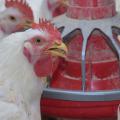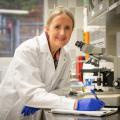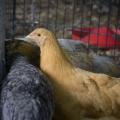Pipped eggs that do not hatch
If chick embryos develop to the pipping stage, or at first shell cracking at hatching, they are normally healthy enough to hatch unless some incubator adjustment prevents it from happening. The problem is usually caused by either 1) poor ventilation or 2) improper humidity.
The air exchange requirement within an incubator is greatest during the last day of incubation. The chick embryo's oxygen requirement continually increases during development and especially when breathing using the respiratory system just before hatching. The vent openings are frequently restricted at this time in an attempt to boost incubator humidity. Instead of helping the chick hatch, the chick is suffocated from lack of ventilation. Never decrease ventilation openings at hatching in an attempt to increase humidity. Increase humidity by other methods. If any vent adjustments are made, they should be opened more.
Another reason for mortality during hatching is improper humidity adjustment. The deaths can be produced from too much humidity during the entire incubation period or from too little humidity during the hatching period.
The desired egg weight loss during incubation caused by water evaporation is about 12 percent. If humidity during incubation is kept too high, adequate water evaporation from the egg is prevented. The chick can drown in the water remaining in the shell at hatching. A dried coating around the chick's nostrils and beak indicates that drowning was likely. Attention to maintaining proper incubation humidity during incubation will reduce the potential for this problem at hatching time.
If the humidity is allowed to decrease after the chick pips the shell, the membranes within the shell can dry-out and stick to the chick. This prevents the chick from turning inside the shell and stops the hatching process. The chick eventually dies. If the membranes around the shell opening appear dried and shrunken, the cause is probably low humidity during hatching. This condition can occur quickly (within 1 or 2 minutes) when the incubator is opened to remove or assist other chicks that are hatching. When hatching begins and proper incubator conditions are attained, the incubator should never be opened until after all chicks are hatched and ready for placement in the brooder.
Publications
News
STARKVILLE, Miss. -- Until an avian flu vaccine for chickens or other alternative is federally approved, commercial poultry operations in the U.S.
STARKVILLE, Miss. -- If egg prices have seemed higher than ever lately, it’s because they are, and consumers can place much of the blame squarely at the feet of the ongoing bird flu outbreak.
With highly pathogenic avian influenza, or HPAI, in the environment in Mississippi, owners of backyard flocks have to take extra steps to keep their chickens healthy.
Avian influenza poses an extremely low risk to human health and none to food safety in Mississippi, but its presence poses a risk to backyard flocks and the state’s $3 billion commercial poultry industry.







